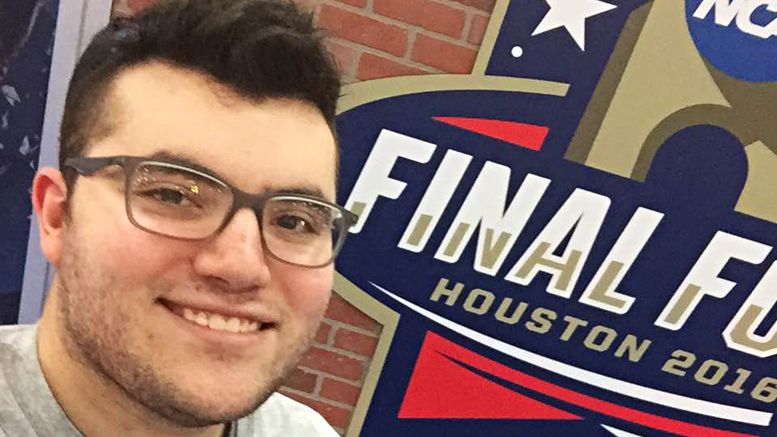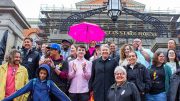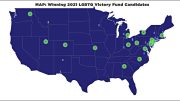Coming Out is easier after others have done it
By: Dan Woog*/Special to TRT—
Growing up in Houston as the son of a multi-sport athlete, it felt natural for Jeremy Brener to play sports. He enjoyed them all, especially soccer and basketball. He coached younger kids in a recreational league. “I’ve just always been enamored with competition and athleticism,” the articulate, insightful high school senior says. “Sports feel safe and comfortable to me.”
Brener lives in a diverse neighborhood; he’s always been surrounded by different cultures, ideas and types of people.
“Maybe I was naïve,” he says. “To be honest, I didn’t know what ‘gay’ meant until I was 12 or 13.” He assumed that because all his friends had mothers and fathers, that “every relationship was between a man and a woman.
“I never heard anything about gay stuff,” he reveals.
But in the midst of junior high basketball season, Jeremy’s “gears started turning. It was a weird time.” He felt different from his friends. He began understanding his burgeoning sexuality.
“That’s when life started for me,” Jeremy says. “I started to see other things. It scared me.”
Jeremy thought that being gay meant “acting feminine, doing feminine things.” But he did not fit there. He liked playing and watching sports.
Jeremy went online, reading and hearing other gay men’s stories. He saw many different examples of what it means to be gay, how to live life. He realized he could be gay, play sports and hang out with other guys who like him for who he is.
“There’s a whole spectrum of masculinity,” he recognized. Pretty heady stuff for a 14-year-old.
Through YouTube, Outsports, the Advocate magazine and websites like Gay Star News, Jeremy “really started to wake up. I knew this is who I’m supposed to be.”
Once he discovered he was gay, he thought that was the most important part of his personality. He wanted to tell everyone, to stop living a lie.
Now, he wishes he had not been so forthright. “Being gay is not the most important thing about me,” he says emphatically. “You can lead a truthful, honest life without telling the whole world.”
Friends slowly distanced themselves. His grades dropped. “I thought living my truth would be wonderful,” Jeremy explains. “That wasn’t the case.”
Then, in February 2013, Los Angeles Galaxy soccer player Robbie Rogers came out. He was the first professional male sports team athlete in North America to do so.
Jeremy was coming off a knee injury. Compounded by his friends’ reactions to his sexuality, he considered giving up soccer. But Rogers’ coming-out experience propelled Jeremy back in the game. He even changed his jersey to 14. That was Rogers’ number, and also Jeremy’s age.
Jason Collins and Michael Sam soon followed Rogers out the closet door. “I realized there really are gay people everywhere,” Jeremy recalls. “And I saw that being gay is only part of a person. That’s why Outsports (the LGBT website) is great. It really debunks stereotypes.”
For his last two years in high school, Jeremy focused on just being himself. “People like me for me,” he says proudly.
So who is Jeremy Brener? “I’m an athlete, a basketball coach, a friend, a brother, a son. I like physics and business. I’m so much more than a gay teenager. I’m proud to be gay, but I’m also proud of every part of me.”
Jeremy is also a contributing writer for Outsports – the site that did so much to show him the world of gay athletics. Earlier this month, he wrote a story about Braeden Lange, the 13-year-old gay lacrosse player whose life was turned around by Andrew Goldstein, a former pro with his own positive tale. Braeden’s coming out at a young age, facing some negative reactions, and still emerging empowered and strong – it all resonated with Jeremy.
He wove together Braeden’s story – including the “Courage Game” organized by Goldstein, bringing together lacrosse players from around the country in a show of support for the youngster; an ESPN profile on the game and Braeden’s life, and the founding of Philadelphia’s Courage Home for homeless LGBT youth – with Jeremy’s own coming-out process. It was a compelling read.
The next day, a young reader contacted Jeremy. He was struggling, and alone. Soon, though, he came out – and felt great.
“That was so powerful,” Jeremy says. “If I weren’t gay, that kid wouldn’t have felt confident enough to do that.
“I’m gay for a reason,” Jeremy concludes. “Now I want to try to make a difference in the world.”
He doesn’t have to try. He already has.
*Dan Woog is a journalist, educator, soccer coach and gay activist. His latest book is “We Kick Balls: True Stories from the Youth Soccer Wars.” He can be reached care of this publication or at OutField@qsyndicate.com







